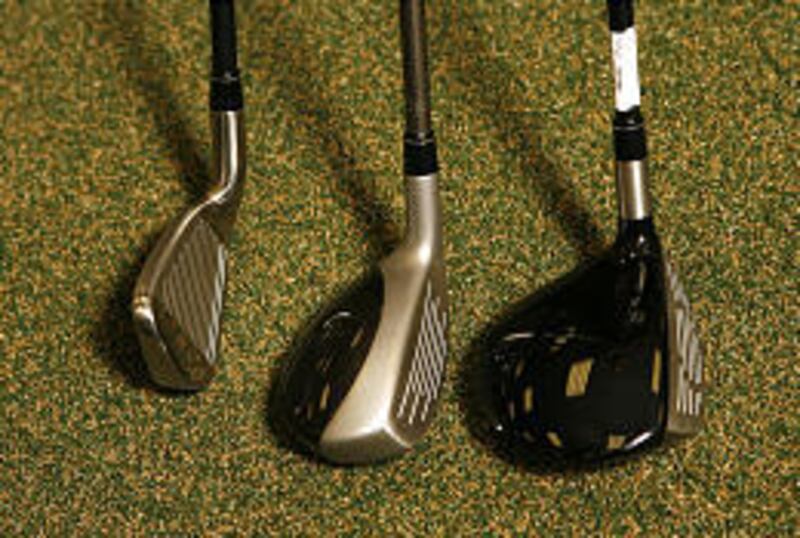Go to any golf course and take a peek into the various golf bags sitting around and you're bound to see a hybrid golf club.
Hybrids are the latest rage in golf.
According to the Darrell Survey, a Los Angeles-based group that tracks the golf industry, more than 25 percent of U.S. golfers carry at least one hybrid club, up from just 7.5 percent in 2004.
Everyone from PGA Tour professionals to single-digit handicappers to the folks who can't break 100 are carrying hybrid clubs in their bags.
"It's the fastest growing segment of clubs we sell, for sure," said Paul Hammond, the general manager for Golf Galaxy in Salt Lake County. "They have increased dramatically in the last few weeks.
"People see professionals on TV using them and they come in and get one."
Joe Judd, the general manager of Uinta Golf in Salt Lake City, agrees that hybrids are the fastest growing category of clubs his store sells.
"They're easier to hit, more forgiving and they make the game more enjoyable, really," Judd said. "Everybody should have a hybrid club."
So what is a hybrid?
By definition, it is a "cross" or a "fusion" of two different items, in this case a metal-wood and an iron. Each manufacturer's hybrids are slightly different, but basically they look like small woods or very fat irons. The shafts are shorter than a comparable wood and slightly longer than a comparable iron. The heads have a lower center of gravity, making it easier for shots to get airborne.
The purpose of hybrids is simply to make golf easier. Most hybrid clubs replace long irons, the 2-, 3- or 4-iron, the hardest clubs in the bag to hit.
"Most amateurs have no business hitting any iron lower than a 5-iron," Chip Brewer, chief executive of Adams Golf, one of the leaders in hybrids, told Golf Digest. "Below that, you need something that's easier to hit."
Taylor Made was one of the pioneers in hybrid clubs. The company's "rescue" club came out in the late 1990s, and many believe it was the Rescue Mid, used by Utah's Mike Weir and other top pros, that jump-started hybrid sales in 2003. Weir still uses the club and refers to it as "the rescue."
According to the Darrell Survey, Taylor Made more than doubles the amount of the next competitor in hybrids used on the PGA Tour.
However, a smaller company called Nickent bills itself as "king of the hybrids" and claims to be the top hybrid club used on the Nationwide Tour for three straight years. Last week's winner of the Knoxville Open, Hunter Haas, used a Nickent, which is less expensive than the name-brand hybrids.
If you go into a store to buy a hybrid, many salespersons will tell you that price doesn't make a huge difference in the quality.
Generally, the price of a hybrid club is between $50 and $200 with graphite shafted clubs costing about $10 more.
One of the latest developments in hybrid clubs is the full set.
Instead of just one hybrid, you can have eight in your bag.
Tour Edge Golf sells complete sets of hybrid clubs, if you can imagine, with eight clubs — 3 through wedge — under the Bazooka name.
Steel-shafted clubs go for $450 and the graphites for $500.
Other companies, such as Adams, sell a mixture, with four hybrid clubs (3-6) and four irons (7-P) for under $500.
Three major companies,
Callaway, Nike and Titleist, dragged their feet and jumped on the hybrid bus late.
As late as 2004 Callaway was stubbornly staying away from hybrids, apparently thinking it was a passing fad.
Alan Hocknell, Callaway's senior director of design, said at the time, "Our Big Bertha long irons and high-lofted fairway woods perform just as well as any hybrid we could make."
Now Callaway has its own hybrid lines, including the Heavenwood and the Fusion, while Titleist and Nike also have their own hybrid lines.
Not everyone is sold on the hybrids, however. Many top professionals do just fine without a hybrid club.
Two of Utah's best senior golfers, Roy Christensen and Kean Ridd, who finished 1-2 at the U.S. Senior Open qualifying earlier this week, don't carry a hybrid in their bag.
"I just don't feel comfortable with it," said Christensen, who will represent Utah in next month's U.S. Senior Open.
Ridd, who is the head pro at East Bay Golf Course in Provo, acknowledges that hybrids have "really exploded" and that he sells a lot at his course. But he's not sold on them for his game.
"I'm a dinosaur," said Ridd, who owns a hybrid, but usually doesn't carry it in his bag. "I don't see that much difference between it and my 3-iron or 5-wood."
But Ridd figures he'll eventually he'll jump on the bandwagon.
With a chuckle he said, "I may have a whole bag full in a few more years."
Maybe we all will.
E-mail: sor@desnews.com


